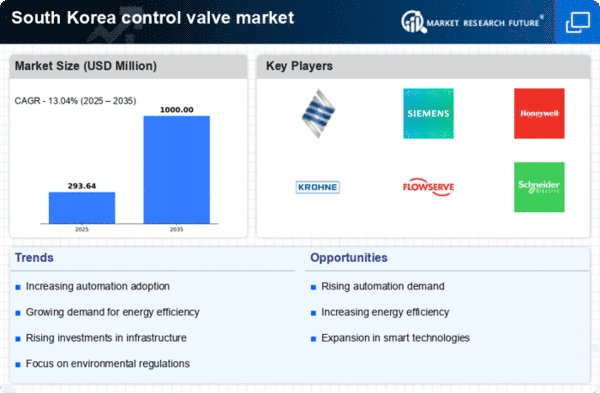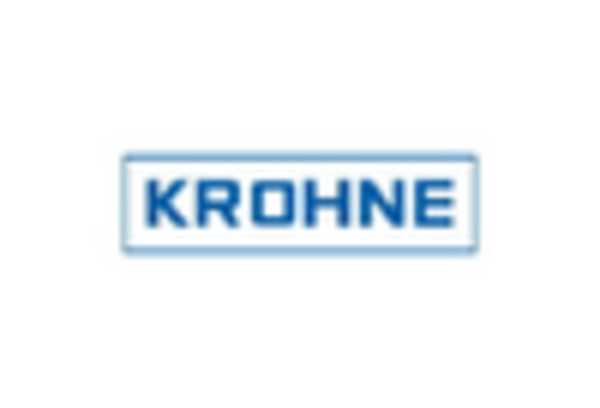Rising Industrial Automation
The control valve market in South Korea is experiencing a notable surge due to the increasing adoption of industrial automation across various sectors. Industries such as manufacturing, oil and gas, and water treatment are integrating advanced automation technologies to enhance operational efficiency. This trend is likely to drive demand for control valves, which are essential for regulating flow and pressure in automated systems. According to recent data, the automation market in South Korea is projected to grow at a CAGR of approximately 8% over the next five years, indicating a robust growth trajectory. As industries seek to optimize processes and reduce operational costs, the control valve market is expected to benefit significantly from this shift towards automation.
Growth in Renewable Energy Sector
The control valve market in South Korea is poised for growth, particularly due to the expansion of the renewable energy sector. As the country aims to increase its reliance on renewable energy sources, such as wind and solar, the need for efficient control systems becomes paramount. Control valves are essential components in managing the flow of fluids in renewable energy applications, including hydroelectric power plants and bioenergy facilities. The South Korean government has set ambitious targets for renewable energy, aiming for a 20% share in the energy mix by 2030. This commitment is likely to stimulate investments in control valve technologies, thereby enhancing the market's growth prospects. The integration of control valves in renewable energy systems is expected to be a key driver for the control valve market in the coming years.
Technological Innovations in Valve Design
Technological innovations in valve design are playing a pivotal role in shaping the control valve market in South Korea. The introduction of smart valves equipped with IoT capabilities is transforming how industries manage fluid control. These advanced valves offer real-time monitoring and data analytics, enabling operators to optimize performance and reduce downtime. As industries increasingly adopt smart technologies, the demand for innovative control valves is expected to rise. The South Korean control valve market is projected to witness a growth rate of approximately 6% annually, driven by these technological advancements. Companies are likely to invest in research and development to create more efficient and reliable valve solutions, further propelling the market forward.
Regulatory Compliance and Safety Standards
In South Korea, stringent regulatory compliance and safety standards are becoming increasingly critical for industries, particularly in sectors such as chemicals and pharmaceuticals. The control valve market is directly influenced by these regulations, as control valves play a vital role in ensuring safe and efficient operations. Compliance with safety standards necessitates the use of high-quality control valves that can withstand extreme conditions and prevent leaks or failures. The South Korean government has implemented various regulations aimed at enhancing industrial safety, which in turn drives the demand for reliable control valves. This focus on safety and compliance is expected to propel the control valve market, as industries prioritize investments in advanced valve technologies to meet regulatory requirements.
Expansion of Water and Wastewater Treatment Facilities
The control valve market is significantly influenced by the expansion of water and wastewater treatment facilities in South Korea. With increasing urbanization and population growth, the demand for efficient water management systems is on the rise. Control valves are critical in regulating water flow and pressure in treatment plants, ensuring optimal performance and compliance with environmental standards. The South Korean government has allocated substantial funding for the development and modernization of water infrastructure, which is projected to exceed $10 billion over the next decade. This investment is likely to create substantial opportunities for the control valve market, as new facilities and upgrades to existing systems will require advanced valve solutions to enhance operational efficiency and sustainability.
















